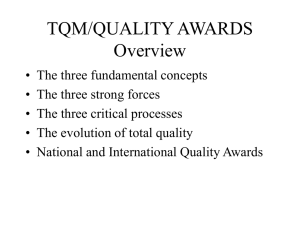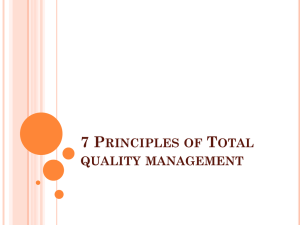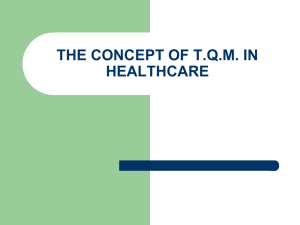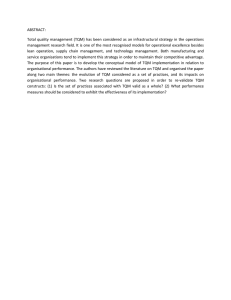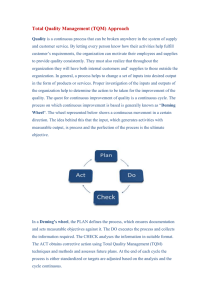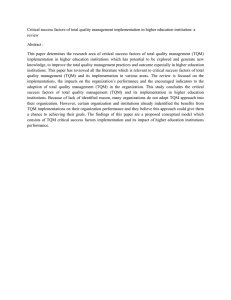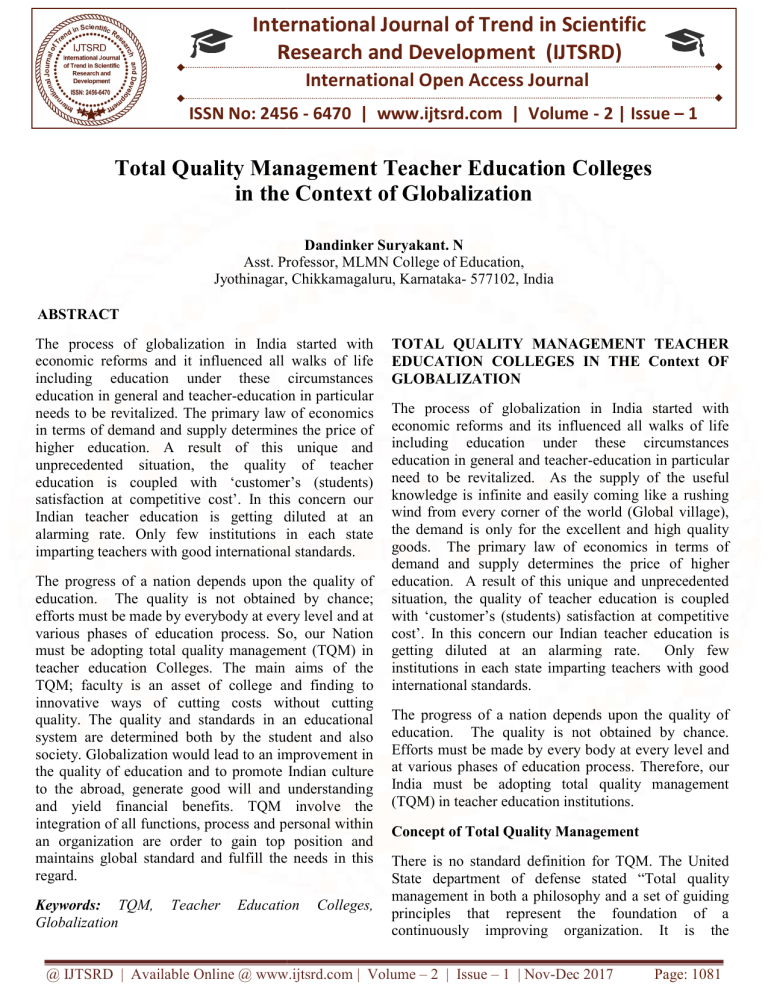
International Journal of Trend in Scientific
Research and Development (IJTSRD)
International Open Access Journal
ISSN No: 2456 - 6470 | www.ijtsrd.com | Volume - 2 | Issue – 1
Total Quality Managem
Management
ent Teacher Education Colleges
in the Context oof Globalization
Dandinker Suryakant. N
Asst. Professor, MLMN College of Education,
Jyothinagar, Chikkamagaluru, Karnataka
Karnataka- 577102, India
ABSTRACT
The process of globalization in India started with
economic reforms and it influenced all walks of life
including education under these circumstances
education in general and teacher-education
education in particular
needs to be revitalized. The primary law of econo
economics
in terms of demand and supply determines the price of
higher education. A result of this unique and
unprecedented situation, the quality of teacher
education is coupled with ‘customer’s (students)
satisfaction at competitive cost’. In this concern our
Indian teacher education is getting diluted at an
alarming rate. Only few institutions in each state
imparting teachers with good international standards.
The progress of a nation depends upon the quality of
education. The quality is not obtained by cha
chance;
efforts must be made by everybody at every level and at
various phases of education process. So, our Nation
must be adopting total quality management (TQM) in
teacher education Colleges. The main aims of the
TQM; faculty is an asset of college and fin
finding to
innovative ways of cutting costs without cutting
quality. The quality and standards in an educational
system are determined both by the student and also
society. Globalization would lead to an improvement in
the quality of education and to promote Indian culture
to the abroad, generate good will and understanding
and yield financial benefits. TQM involve the
integration of all functions, process and personal within
an organization are order to gain top position and
maintains global standard and fulfill
ill the needs in this
regard.
Keywords: TQM,
Globalization
Teacher
Education
Colleges,
TOTAL QUALITY MANAGEMENT TEACHER
EDUCATION COLLEGES IN THE Context OF
GLOBALIZATION
The process of globalization in India started with
economic reforms and its influenced all walks of life
including education under these circumstances
education in general and teacher-education
teacher
in particular
need to be revitalized. As the supply of the useful
us
knowledge is infinite and easily coming like a rushing
wind from every corner of the world (Global village),
the demand is only for the excellent and high quality
goods. The primary law of economics in terms of
demand and supply determines the price of higher
education. A result of this unique and unprecedented
situation, the quality of teacher education is coupled
with ‘customer’s (students) satisfaction at competitive
cost’. In this concern our Indian teacher education is
getting diluted at an alarming
ming rate.
Only few
institutions in each state imparting teachers with good
international standards.
The progress of a nation depends upon the quality of
education. The quality is not obtained by chance.
Efforts must be made by every body at every level and
at various phases of education process. Therefore, our
India must be adopting total quality management
(TQM) in teacher education institutions.
Concept of Total Quality Management
There is no standard definition for TQM. The United
State department of defense stated “Total quality
management in both a philosophy and a set of guiding
principles that represent the foundation of a
continuously improving organization. It is the
@ IJTSRD | Available Online @ www.ijtsrd.com | Volume – 2 | Issue – 1 | Nov-Dec
Dec 2017
Page: 1081
International Journal of Trend in Scientific Research and Development (IJTSRD) ISSN: 2456-6470
application of quantitative methods and human
resources to improve the material and services supplied
to an organization, all the processes within the
organization and the degree with which the need ants
expectations”.
Basic concept of TQM:
TQM applied to teacher education institution may be
thought of us a way of organizing and involving the
whole institution; every department, every activity and
every single person (management, principals, teachers,
students and staff) at every level towards achieving
academic excellence, high quality education and
research growth of institution student satisfaction and
moulding teachers of highest caliber. Its main purpose
is asset of institution is the faculty. If faculty is well
developed, they would certainly developed student
highest and global standards. In this context US
institutions are using TQM principles in the
administration, and academic activities. But India may
start implementing TQM principle at least in a small
way to begin within administration and academic
programmes in this regard.
TQM in Teacher Education:
TQM have to find innovative ways of cutting costs
without cutting quality. Quality has been borrowed
from industry by education quality is usually defined as
the totality of features and characteristics of a product
of service, that bear on its ability to satisfy stated or
implicit needs. The quality standards in an educational
system are determined both by the consumer i.e., the
students and also the society that pay for the system.
RESPONSIBILITIES OF THE INSTITUTIONS:
Flexible system of education may be introduced
with a variety of elective subjects as per national
and global needs.
Student should also be made to realize the
importance of learning process. The following
parameters play a vital role.
-
Maintaining minimum 80 percent attendance in
each subject.
-
Teaching aids and ICT must use in practical
teaching.
-
Submission of all home assignment regularly.
-
Internship teaching is compulsory to all
students.
-
All student participate
seminars etc.,
group
discussion
Development of student oriented academic culture.
This is possible by creating opportunities for their
participation in curricular and extracurricular
activities etc., and provided necessary facilities.
Internship training should be made compulsory for
every student and made video recording of teaching
each student has to deliver a daily class.
RESPONSIBILITIES OF THE FACULTY:
The important requirement of a teacher is training and
guidance of students.
Teacher should have
psychological skill, quite tactful, good communication
skills and have following important qualities to be
partner in TQM in teacher education.
1) To impart right knowledge to the students teachers
according to the developmental needs of society
and prepare them to take part in nation building.
Teacher must motivate the students to actively
participate in teaching learning process and research
works, like Workbook, Resource book, Action
research etc.
2) To make efforts to bring out talent creative skills
hidden in them and thereby make them contribute to
the prosperity of our country. In order to satisfy the
above goals desirable measures related to students
teachers, faculty, and administration.
Teacher should be improve their subject knowledge
and teaching methods continuously by attending
refresher
course,
orientation
programmes,
workshop, seminars etc.
RESPONSIBILITIES
TEACHERS:
Senior faculties should train the junior teachers and
create awareness in them. They are also partners in
achieving TQM goals in the academic programme.
OF
THE
STUDENTS
Imparting high quality teacher education includes
inculcating in students the zeal and initiative for
learning the subjects and also the connected new
topic.
Teachers are changing to achieve academic
excellence and growth in institution. They must
know how to train the mission and objectives of
institution in to academic values and practical. They
@ IJTSRD | Available Online @ www.ijtsrd.com | Volume – 2 | Issue – 1 | Nov-Dec 2017
Page: 1082
International Journal of Trend in Scientific Research and Development (IJTSRD) ISSN: 2456-6470
also know to teach the student to achieve highest
goal in education.
Teachers should invite to the excellent
professionals, innovators in different fields of
teacher education around the world and transfer the
same to his students for improvement of their
professional knowledge.
Faculty in teacher education institutions, are
expected to have good exposure to the teaching, so
that they can enrich the minds of the students with
teaching skills.
Teachers should constantly make efforts to improve
their teaching, for better assimilation of subject
knowledge and must be stress basic concept of the
subjects before touching the advance topic.
Students must be guided effectively to refer to their
own notes and assignment.
TQM in education institution call for continuous
assessment of student by way of conducting weekly
objective tests in theory subject, practical class,
assignments with though provoking topic which
include open ended problems and care studies.
RESPONSIBILITIES
ADMINISTRATION:
OF
THE
Every teacher education institution must have
necessary infrastructure facilities as per norms laid
out by NCTE/UGC/NAAC/QCI and affiliating
university.
With regard to working and facilities in officer
TQM call for providing necessary communication
facilities and other facilities.
Every teacher education institution must
compulsory follow norms laid out with regard to
selection and recruitment procedure of faculty,
office staff laboratory staff etc.
The administrations have responsibility to provide
the necessary training and job opportunities.
Therefore, establish guidance and counseling center
in the institution.
Provide good library with required number of
books, volumes and journals. It should be well
equipped with adequate furniture facilities and
conductive atmosphere for effective study.
TQM concept asset of institution faculty and the
staff in the institution must be provided with salary
and other facilities as per NCTE/UGC norms.
The administration of any teacher education
institution which includes principal, management
and governing body should have a commitment to
implement TQM and make the institution as one of
the centers for global excellence in teacher
education institutions.
TQM IN TEACHER EDUCATION COLLEGES
AND GLOBALIZATION
Globalization refers to a process of removing
government imposed restrictions on movements
between countries in order to create an ‘open’
‘borderless’ world economy (Scholte-2000:16).
According to Hirst & Peters “Globalization as simply
another adjective to describe cross border relations
between countries”. It is describes the growth in
international exchange and independence. In this
connections TQM would lead and innovate ways of
cutting costs without cutting quality of education with
global standards.
Therefore, TQM lead teacher
education institution for international standards as
following aspects:
Good teaching and physical infrastructure facilities.
Well-equipped science laboratories, computer
laboratories and adequate library resources.
Social infrastructure should be strengthened to
international level if should laid cultural change and
mutual understanding
Courses should be introduction of semester system,
as international needs.
The highest priority needs to be given by academic
institution to the updating and internationalization
of the curriculum.
ICT, internet and E-learning facilities.
CONCLUSION:
Globalization would lead to an improvement in the
quality of education, promote Indian culture abroad,
generate good will and understanding, and yield
financial benefits. Therefore, implementation of TQM
in teacher education institution call for a total change in
culture in terms of customs, practices and
improvements by creating increased sense of caring
brought about by improved communication,
involvement and training. It involves the integration of
@ IJTSRD | Available Online @ www.ijtsrd.com | Volume – 2 | Issue – 1 | Nov-Dec 2017
Page: 1083
International Journal of Trend in Scientific Research and Development (IJTSRD) ISSN: 2456-6470
all functions, processes and personnel within an
organization are order to achieve continuous
improvement in the quality of teacher education. TQM
principle can bring about harmony and quality working
style in all the facts of the institution and help it gain
the top position and maintain global standard. TQM
consists of doing for the institution what should be
done as a matter of course. The fruits of
implementation of TQM may not be available instantly,
like magic tree, but it is sure to show improvements in
academic and administration standards as the global
needs.
REFERENCES
1. B.R. Garg. Issues in Teacher Education. The Indian
publication J. Ambala Cantt, (India).
2. H.L. Verma and N.K. Bishnoi. Quality Assurance
and Funding in Higher Education. Vol. 39, No. 48,
Nov 26, Dec 2, 2001.
3. H.V. Deshpande. Quality and excellence in Higher
Education–A vision. University News. Vol.40
No.14, April 8-14, 2002.
4. K. Srivastava, M. Sodha & U. Vashishtha. Teacher
Education in 21st Century Challenges and
Opportunities. University News. Vol. 35, No.45,
Nov 10, 1997.
5. N. Kumraswamy and C. Subba Rao. New Economic
Policy and Technical Education and training to
India. University news. 9 Jan – 1995.
6. Noorjahan N.Ganihar. TQM in teacher education
institutions. Published by TECEF,Bangalore.
7. R.P.
Shukla.
Quality
teacher
education
programme–some considerations. University News.
Vol.36, No.19, May 11, 1998.
8. Report on the AIU. Internationalization of Indian
Higher Education. University News.Vol.39, No.15,
April 9-15, 2001.
9. Thomas Mathew and K.M. Madrecha. Quality
management strategies for India Industry. Indian
Engineering Journal. Vol.23, No.2, Feb – 1994.
10. Turkish Online Journal of Distance Education –
TOJDE. Vol.3, No.3, July 2002.
11. http://www.nwrel.org/scpd/sirs/9/s035.html
12. www.google.com
@ IJTSRD | Available Online @ www.ijtsrd.com | Volume – 2 | Issue – 1 | Nov-Dec 2017
Page: 1084

